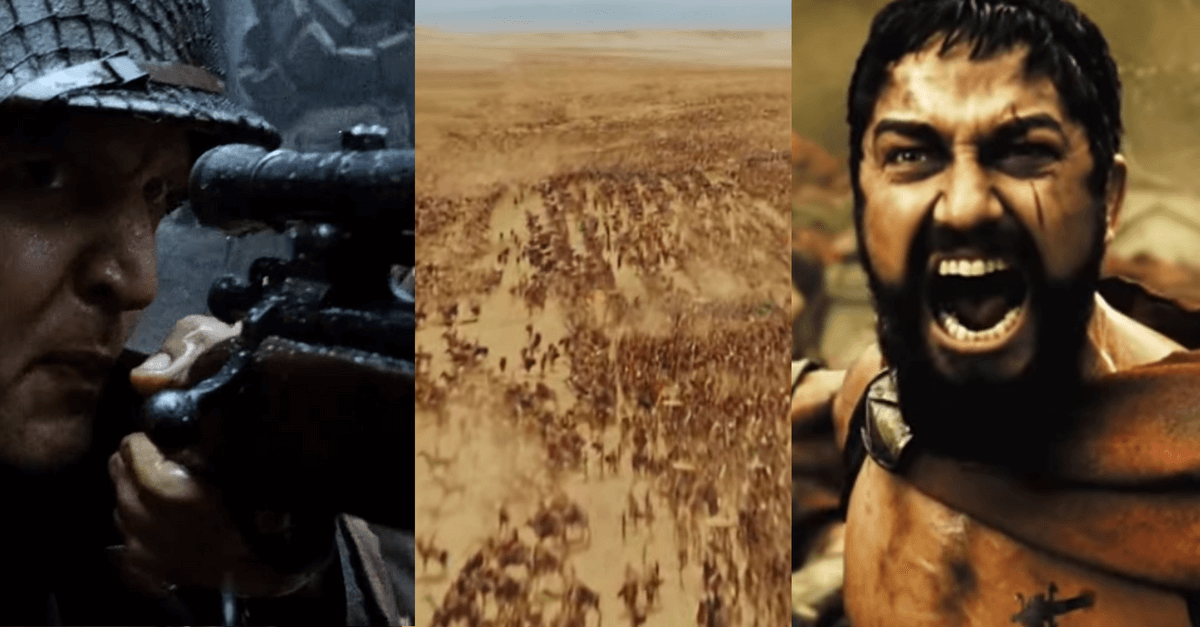Many readers may be put off reading this title and not bother with the article! However, please read on.
Historical movies have a terrible reputation concerning accuracy and are often full of mistakes. They do not usually get praised for the positives they bring to history and, in spite of all the errors; these movies do two things very well.
First, they bring history to the masses in an enjoyable form.
Second, they can bridge the gap from generalized and incorrect notions to real academic learning on historical topics.
This idea may cause some historians concern. Many scholars hold the opinion Hollywood history is worthless, and information should be obtained from books. However, Herodotus’ account of the battle of Thermopylae is almost as inaccurate as the movie 300.
Historical documentaries can also be full of incorrect information. Few of these programs about Rome do their subject justice, and many times speculative ideas are simply given as facts. Caesar’s autobiography contains some of the best Roman propaganda ever written.
As this is a military history site, this article is about historical war media, rather than historical movies like the Sound of Music or complete fantasy such as Clash of the Titans.
The excellently written book Roma, by Steven Saylor, follows generations of fictional Romans. The chapters explore each fascinating bit of history about the eternal city. There are plenty of historical liberties and simple mistakes, but it gives a sense of ancient Rome and how the people may have responded to the significant events of their time.
The Patriot movie is also full of errors, especially favoring Patriots, of course. It does give a good, if biased, understanding of how some battles were fought and how the war for independence affected early Americans.
With books, it can be difficult to pick out every wrong detail, but with movies, everything is there for you to see in just a few hours. There are plenty of websites dedicated to movie mistakes, historical and otherwise.
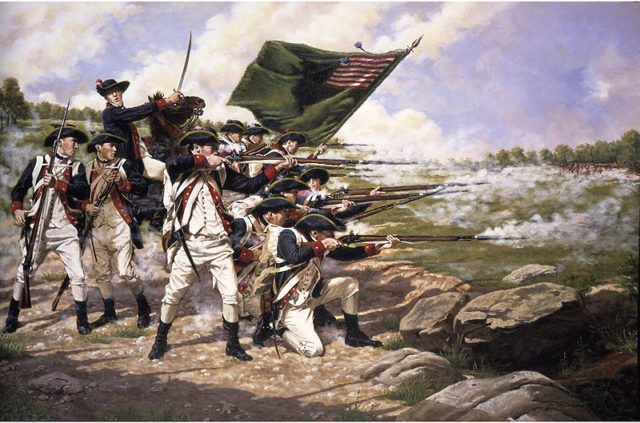
Movies get criticized historically because they are easy targets, but they do appeal to the masses.
The film 300, is a good example. Not many people knew who Leonidas was and what the stand at Thermopylae was about before the movie. The movie is the reason Greece still has T-shirts that say “This is SPARTA!” on them.
300 was also a great movie as an example of point two: bridging the gap from video learning to education.
Using the film as a base this can happen as it is playing. Many people have a friend or family member who is knowledgeable about history. They often do not hesitate to bombard them with questions like: “Did the Spartans dress like that? Were there only 300 of them at Thermopylae?” and much more.
These questions are great because the moviegoer who had almost no knowledge of the Greco-Persian wars can get a little extra education. They know 300 while being an excellent film, is mostly aesthetically inaccurate, and they have learned more of the real history.
The History Channel aired documentaries about Thermopylae apparently made and aimed at the scores of people who saw the movie. Even now, someone who watches the movie could decide to order a book on the topic or read a Wikipedia article. They are learning history through a Hollywood movie.
300 is based on a comic, which is based on historical facts. People argue it is irrelevant because it is based on a comic, but that ignores the reality basis.
It is harder to evaluate cultural impact. A movie does not have to be entirely accurate to convey a general sense of the times or the emotions of a particular event. The surge up Omaha Beach in Saving Private Ryan is one of the most impactful scenes in decades of war movies.
This scene is fairly accurate but also shows the fear, bravery, horror and hopelessness better than almost any other type of media whereas the historical footage does not quite give the events justice in terms of the feeling of the moment. To have the sense of D-Day expressed in such a professional and well-directed way added to the seriousness of the battle.
The Last Samurai movie is an excellent example of portraying general themes. It blends history. The setting is the Meiji Restoration when Japan was transitioning out of their medieval era and adopting Western culture, from technology to weapons and customs. There were several rebellions, many led by samurai, but the movie combines them into one massive resistance and shows the samurai as good and the government as evil.
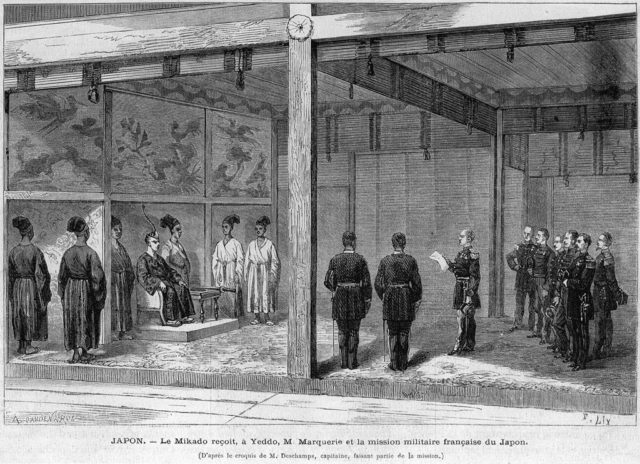
The movie does a fantastic job illustrating how quickly Japan transformed and how that created a backlash throughout the social classes. It shows the samurai as calm and wise people living simply off the land, and rebelling but with respect for their emperor.
In reality, most of the samurai were bitter and frustrated that firearms and reforms were eroding their traditional positions of power. Even so, the last battle in the film shows the sadness and the end of an era that was certainly felt by the Japanese people.
The Last Samurai is a great film for an introduction to Japan and Japanese history. Western educations often gloss over Asian history, as it is difficult to relate to and also far away geographically. However, a western movie with an American star can help bridge the gap to real learning. It is better to know the Meiji Restoration occurred and think there was only one rebellion half led by an American than to know nothing of Japan’s history.
The movie Pearl Harbor is often ridiculed, but it deals with a significant event. Some people have no idea Americans fought the Japanese during WWII. They know Pearl Harbor was attacked, and that was what started WWII for America, but that is all.
Watching this film, or HBO’s Pacific mini-series means people may learn about these real events.
Someone I knew thought each tank in history only needed one man to operate it. After watching the WWII film, Fury, they now realize there were several people all with very important jobs.
It is important to remember that, sometimes, Hollywood does get historical movies right. The Patriot, for all its Redcoat hatred, gives a few excellent glimpses of Revolutionary War battles. The way in which the troops marched in lines and stood and shot at each other is a crazy concept today, but that is how some of the battles were fought. In this movie the scene where the two main characters stare out the window at the revolutionaries losing a fight is very well done, with regard to technical limitations.
The movie Alexander shows the Macedonian Phalanx operating in all its glory. The first battle shown in the film at Gaugamela does an excellent job displaying the tactics Alexander set up to achieve victory. Gaugamela was a complicated fight, and charts and graphs do not do it justice. The film favors the Macedonians but does a great job showing how the perfect rows of pikes could get messy when the pressure was on.
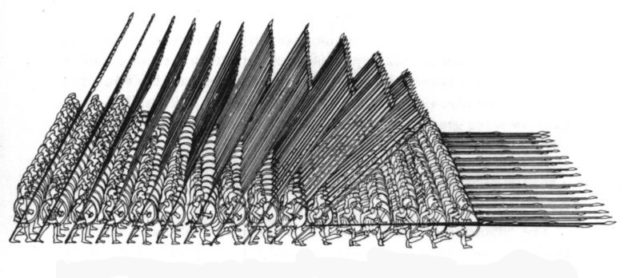
The movie 300, for all its mistakes, is fairly accurate in one important detail. 300 is the story of Thermopylae as a Spartan would have told it. It is a campfire story, not an attempt at an exact representation of a historical setting.
Some blockbusters are much more accurate than given credit for. Master and Commander is a movie about a British ship hunting down a better French ship around South America during the Napoleonic Wars. It is a fictional chase, the ships themselves never had an encounter, but that aside, the film is remarkably true to history. The language they used; the ship’s construction; weapons; and tactics, everything was as precise as possible. The movie could almost be a documentary on single ship combat tactics during the Napoleonic War.
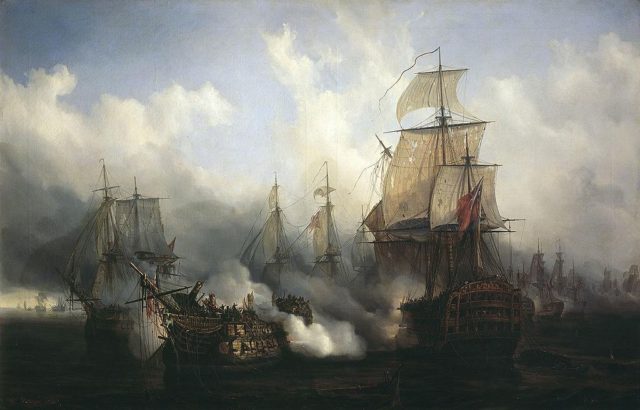
I wish there were more movies like Master and Commander; I never want Hollywood history epics to go away. If taught well a historical film can be used in school to engage students and bridge the gap to real history. Showing a slide from the movie 300 is an excellent way to explain to students how the movie does a good job of showing Spartan attitudes during the war. Spartan quotes used in the movie provide an opportunity to teach about Laconic phrases.
A Spartan would retell the story of how they fought without a breastplate because they were fearsome, but in reality, they fought with a lot more armor.
A talk about the importance and difficulty of D-Day could be significantly augmented with the introductory scene in Saving Private Ryan. Like a teacher embracing rap in a poetry class to connect with students, Hollywood movies can make the same engaging connection, providing they are taught correctly.
Those with serious backgrounds in history might scoff at the thought of people learning history from movies, but not everyone has a library of WWII textbooks and piles of documentaries. Everyone who has seen 300 is now aware that the Spartans wore armor, they were helped by about 7,000 other Greeks and slaves, and that Xerxes looked nothing like a seven-foot-tall Brazilian guy. Some may have read a book about Thermopylae and learned more.
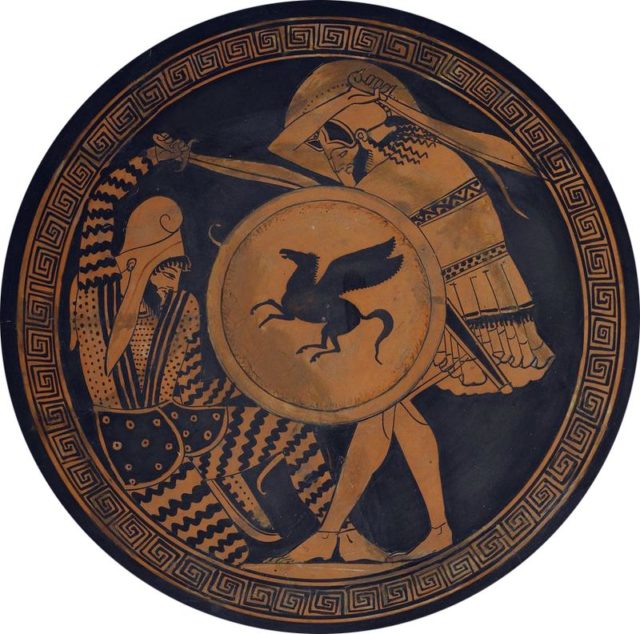
A lot of this article has used 300 as a base, for good reason. 300 seems so obviously wrong historians can not bring themselves to give it any credit for bringing history into modern culture.
At a bare minimum, historical movies give people a window into the past, even if that view is murky or inaccurate. They can give people a basic knowledge; like Scotland rebelling under William Wallace against England or that Americans fought the Japanese in WWII. These details are spread to people through the popularity of these movies, providing more historical awareness.
Going further than the bare minimum, people can learn from these films. Showing Gladiator in a college class to point out that most bouts of fighting did not end in death, while also showing the beautifully rendered Colosseum of Rome and its many underfloor workings.
Lastly, people can be inspired by historical blockbusters to pursue their own education. They can learn how Commodus did fight in the arena, although he was ultimately killed in private by a wrestler, not the fictional Maximus. They can learn that Commodus was as evil and crazy as he was in the movie but in different ways. Historical movies should exist, and they should be looked at for their historical accuracy, not ripped apart and treated as worthless. They give the world access to the past and provide the crucial stepping point to dive deeper into history.
